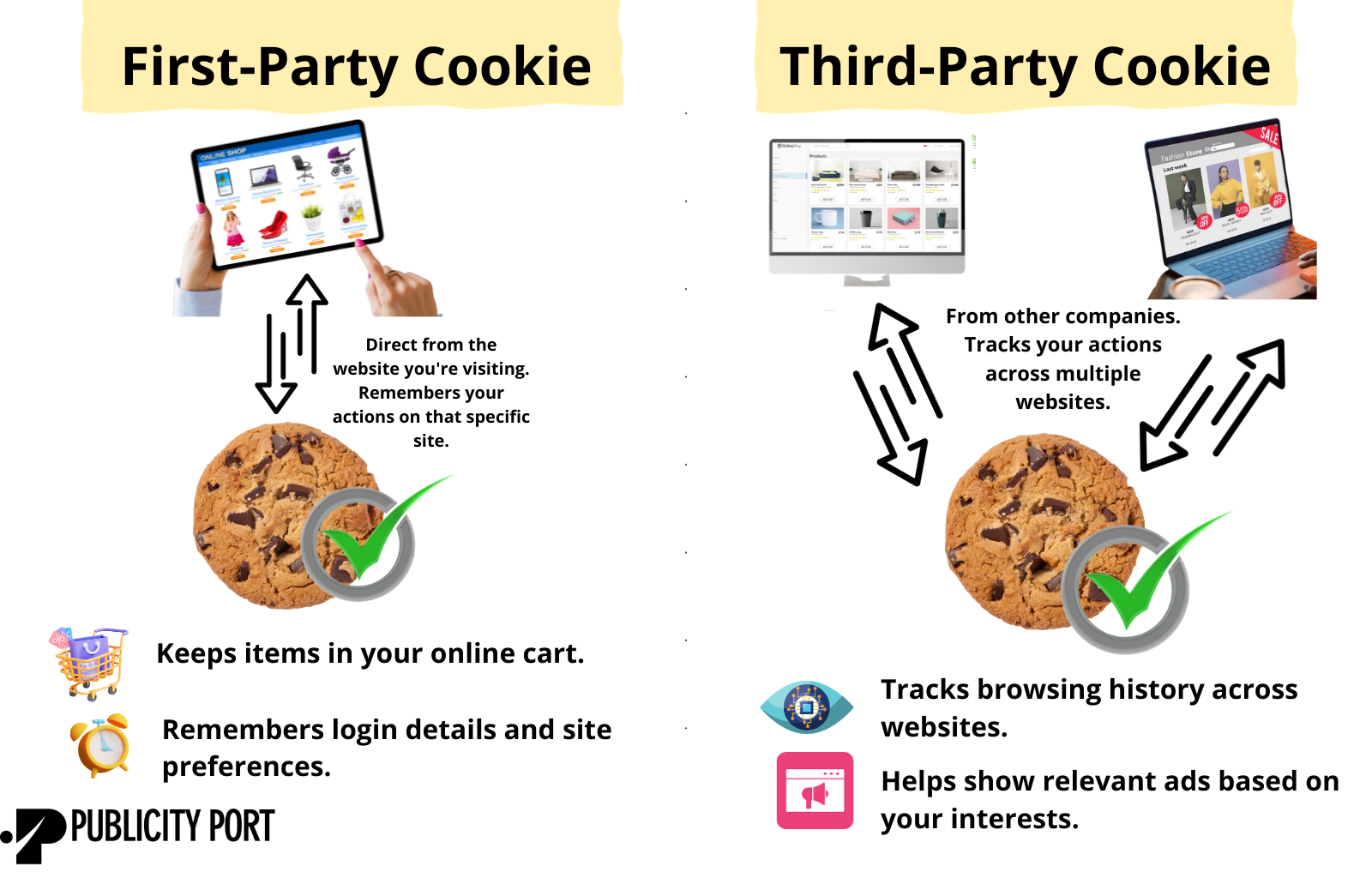In today’s digital world, when you browse the internet, “cookies” track what you do. Not the tasty kind, but tiny pieces of data that remember your actions.
The most debated type? Third-party cookies. For years, they’ve been a key tool for marketers to target ads precisely.
However, due to growing privacy concerns, these cookies are set to disappear. This might sound alarming for digital marketing agencies.
What’s next after third-party cookies?
In this article, we’ll discuss why they’re fading and what tools and strategies might replace them in the evolving landscape of online marketing.
Understanding Third-Party Cookies:
Let’s start with the basics.
Cookies are digital breadcrumbs. Whenever you visit a website, it can leave a little note on your computer, sort of like a guest leaving a note in a friend’s room. These notes can remember,
- What you looked at,
- What you add to your shopping cart or
- Even your login information.
Now, there are two main types of cookies:

- First-party: The “first-party” ones come directly from the website you’re on. For instance, they make sure items stay in your online shopping cart even if you step away for a snack.
- Third-party: “Third-party” cookies are a bit different. They’re placed by other companies that aren’t the main website you’re visiting.
Imagine a friend’s friend leaving a note in that room. These cookies help marketers see what users like you are doing across different websites. For digital marketing agencies, this means they can suggest products or ads that might interest you based on your browsing history.
However, with growing concerns about privacy, people started questioning how these third-party cookies work.
Why? Because not everyone likes the idea of being watched all the time, especially by companies they might not know.
The Fall of Third-Party Cookies:
Third-party cookies have been essential for marketers, but their reign is nearing its end.
Here’s why:
- Privacy Concerns: As users become more conscious of their online privacy, there’s growing unease about being tracked across websites without explicit consent.
- Browser Restrictions: Leading browsers like Google Chrome, Safari, and Firefox are moving towards blocking third-party cookies by default, making it harder for advertisers to gather cross-site data.
- Regulatory Measures: The introduction of laws such as the General Data Protection Regulation (GDPR) in Europe and the California Consumer Privacy Act (CCPA) in the U.S. demand greater transparency and user consent before collecting data, affecting the viability of third-party cookies.
- Public Perception: A shift in public sentiment sees third-party tracking as invasive. People are increasingly using ad blockers and privacy tools to prevent unwanted tracking.
For digital marketing agencies, these developments signal the need to adapt and find alternatives to continue offering value to their clients in this changing landscape.
What Might Take the Place of Third-Party Cookies?
Now that third-party cookies are going away, digital marketers who make ads and websites are looking for new ways to understand what users like.
Here are some of the top ideas they’re thinking about:
1. First-Party Data Collection
This is like when you tell a company what you like directly, maybe by filling out a survey or liking a post on their website.
Why It’s Cool: Companies trust this info because it comes straight from you. It’s like asking your friend about their favorite ice cream flavor instead of guessing.
How It Works: If you sign up for a website’s newsletter or buy something there, they remember that and can show you things you might like next time.
2. Universal IDs
This is a special ID that’s the same everywhere you go online.
Why It’s Cool: It’s like having one library card that works at every library. It helps websites know it’s you without needing lots of cookies.
How It Works: Everywhere you go online, you have the same ID, so websites can recognize you easily.
3. Contextual Advertising
Contextual advertising is about showing ads based on what you’re looking at or reading, not what you’ve looked at before.
Why It’s Cool: This method doesn’t peek into your past online actions. If you’re reading about skateboards, you’ll see skateboard ads.
How It Works: If you’re reading about space, you might see ads about telescopes or space toys. The ads match the topic.
4. Federated Learning of Cohorts (FLoC)
This is a way to group people together who like similar things online.
Why It’s Cool: Instead of looking at one person’s actions, this looks at what a group likes. It’s a mix of personal but still private.
How It Works: Think of being on a team at school. Everyone’s a bit different, but you all work towards the same goal. FLoC puts users into teams like this.
5. Device Graphing
A way to know if one person uses many gadgets, like a phone, tablet, and computer.
Why It’s Cool: It’s like knowing you like to read both paper books and e-books. This helps show stuff you’d like across all your gadgets.
How It Works: If you look at a toy on your phone but buy it on your computer, this method knows it’s still you.
So, third-party cookies were like little spies telling companies what you might buy. But now, we’re looking at new, friendlier ways to guess what you might like. These new methods are like friends giving advice, not spies snooping around.
Conclusion: Challenges Ahead
While these replacements for third-party cookies show promise, they’re not without hurdles. Merging user privacy with precise targeting remains complex.
Digital marketing agencies must navigate evolving regulations, technological shifts, and user expectations, all while striving to maintain effective outreach and meaningful user engagement in the future.